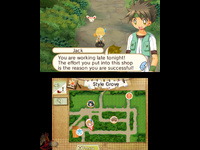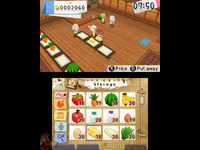|
|

|
PLATFORM
|
3DS
|
BATTLE SYSTEM
|

|
INTERACTION
|

|
ORIGINALITY
|

|
STORY
|

|
MUSIC & SOUND
|

|
VISUALS
|

|
CHALLENGE
|
Very Easy
|
COMPLETION TIME
|
40-60 Hours
|
|
OVERALL

|
- Shop only loosely tied to progression.
- Nothing to do outside of running the shop.
- Weak localization.
- Shop mechanics are very bare-bones.
- Far too long for the amount of gameplay.
|
Click here for scoring definitions
|
|
|
As someone who works in retail, it always fascinates me that shop simulators are so popular. In most cases they don't resemble the actual retail world whatsoever, and yet despite the fact that I live in that world forty hours a week, I can still find a surprising amount of enjoyment in these capitalist endeavors. Or at least in some cases. Hometown Story is an exception, and a terrible one. Despite hailing from the creative mind behind Harvest Moon, Hometown Story feels lazy, stiff, and ultimately pointless.
The game begins with the player arriving in a small forest village, where he is tasked with taking over his nana's shop. And that's about it. There is no overarching plot to speak of — the closest thing players have to an actual goal is collecting the seven pieces of the blue feather, which is said to grant its possessor a wish. They acquire these pieces over time by seeing enough of the in-game events, some of which are interrelated but as a whole are pretty much random asides that have no larger meaning to the game. While the town has a large cast of characters inhabiting it, the localization is weak and none of them receive enough attention for anyone to get attached to them. There's little to care about in Hometown Story, which makes moving forward a chore.
Hometown Story's biggest problem is the fact that its entire sense of progression stems from activating cutscene events rather than from the actual gameplay itself. These cutscenes can be discovered in a variety of ways — visiting specific characters in their homes, having a particular key item in one's inventory, or putting a specific key item up for sale in the shop. A player's ability to run a successful shop and make money has almost no bearing on the events of the game whatsoever, apart from increasing the affection levels of the characters who make purchases. It doesn't help that discovering these cutscenes requires nothing but trial and error. As the game progresses, it may become more and more difficult to actually discover any, to the point where progression slows to a crawl or even halts entirely.
 If I make enough money, can I move away from this stupid town?
If I make enough money, can I move away from this stupid town?
|
|
Speaking of which, buying more goods to sell is one of only two gameplay mechanics in the game outside of running the shop and speaking to the town's inhabitants, the other one being able to pick up items to sell as well. There's really nothing else to the game, and it gets tedious rather quickly, especially considering how ultimately frivolous the shop proves to be. Players won't find the same slew of miscellaneous tasks seen in the Harvest Moon series, and it just makes Hometown Story seem needlessly simple by comparison. Players do have the option of changing their clothing, but unfortunately there are only three outfits to choose from at the start of the game, and new ones don't show up until late and require players to collect several items that only appear randomly from the daily merchant. Even then, there are only a handful of new outfits to acquire.
The shop system, at least, has a few good points to it, but ultimately falls flat when put up against other shop sims like Recettear. Players open their shop everyday at six in the morning and it remains open until midnight, with a ten-minute period passing every real-life minute. Players are free to leave and run around the town, talking to people or visiting the local vendors to stock up on items to sell, but while they are gone customers will continue to shop, lining up for several hours waiting to have their purchases rung up before they leave in frustration. This system makes it easy to keep the shop running, but has obvious logical fallacies that players may question — the lack of theft being a clear oversight.
The system also features a bizarre combo function that gives players a bonus to the money earned on the last transaction if they ring up three or more in a row. Where this extra money comes from is unclear, but even more bizarre is the fact that this flies in the face of basic customer service — the system encourages players to allow the line to grow before ringing anyone in, and to stop ringing customers in when a particularly high-value transaction comes up. It's made all the more amusing by the fact that customers will point this out to the player if they talk to them, asking them to hurry up and ring them through so they can be on their way. Some of the characters that sell the player their goods to stock in the shop will actually come in and buy it back at a higher price!
 Be sure to keep those customers waiting!
Be sure to keep those customers waiting!
|
|
Unfortunately, there isn't anything more complex than that in Hometown Story's retail system. Players can upgrade the size of their shop four times over the course of the game, but doing so requires a large quantity of a certain item that is only sold by the daily traveling merchant. However, the merchant's inventory is randomly selected from several different sets each day, and one may go for days or weeks without being able to purchase any. Players can also manually set the prices of their merchandise, but doing so takes extra time, and considering just how large the shop ultimately becomes, it's an unnecessary hassle that most players won't bother with. All items are automatically marked up ten percent if players don't adjust the price manually, so there's really no need anyways. And, of course, the amount of money players earn ultimately has no bearing on the game whatsoever.
The game's visuals are nothing spectacular either. The environments are bland, and there are only a small handful of them in the entire game, which players will see repeatedly. The map itself is actually irritatingly large, and traversing it takes far longer than it ought to, especially for simple, repetitive tasks like visiting shops to purchase new stock. Even the two Harvest Moon games released in the 3DS's first year on the market look significantly better than Hometown Story. The game's music can sometimes be catchy, and some players may be surprised to learn that it's the work of Nobuo Uematsu, renowned for his work on the Final Fantasy series. Unfortunately, it's not his best work, and the number of tracks in the game are laughable.
To be honest, I have a difficult time even calling Hometown Story a game, as its gameplay mechanics have almost nothing to do with its progression. Without a massive overhaul of how progression in the game works, it would probably have been better served as a visual novel, and even then, it would have been a pretty poor one. It should be noted that I was unable to complete the game. I acquired five out of the seven pieces of the blue feather before the rate of progression slowed to a halt and I was, as best I could tell, at the mercy of a random number generator. By the time I had finally given up on the game, after about forty hours of playtime, I had over $1.7 million and had long since stopped restocking my shop, as it no longer seemed to matter. It was obvious that the money I'd managed to acquire served no purpose other than to buy more goods to sell. Regardless, after forty hours of pointless tedium, I can honestly say that completing it wouldn't have made a lick of difference: if I had acquired the blue feather, my only wish would have been to never have picked up the game in the first place.
Review Archives
|









